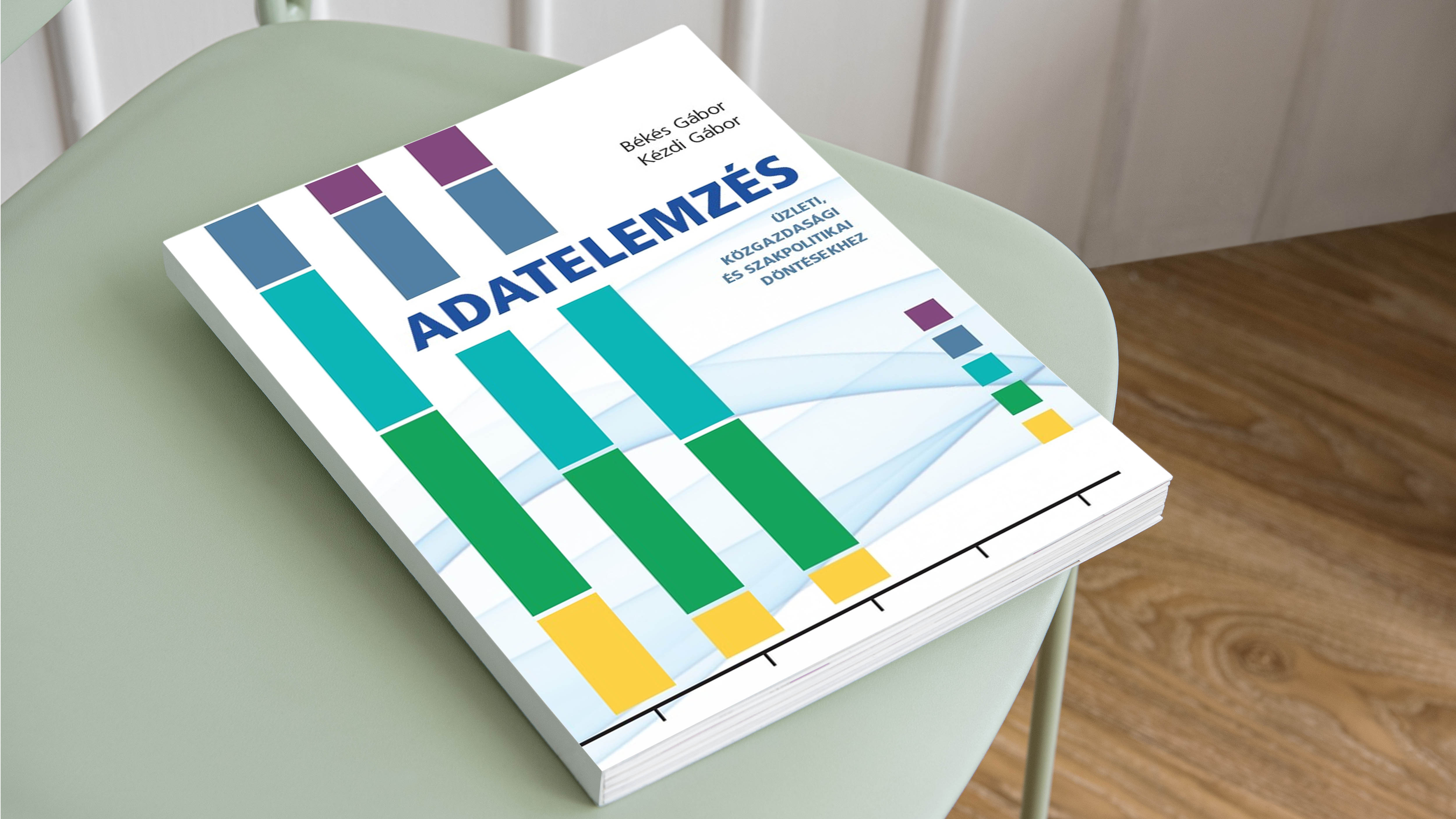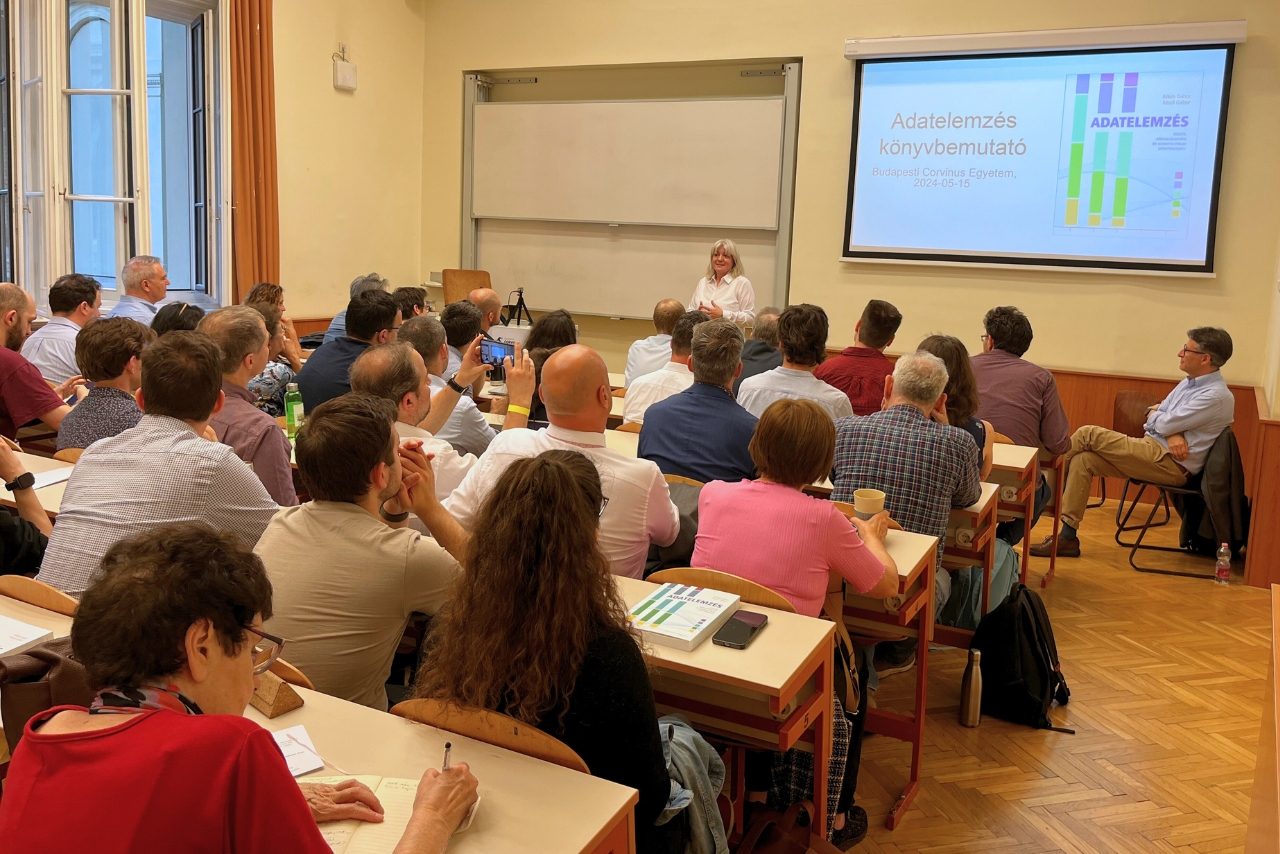Hungarian researchers’ international bestseller on data analysis is a hit in Hungary too

Data Analysis for Business, Economics and Policy has been in Hungarian bookstores for a few days, but it has already become an economic bestseller. The Hungarian version of the book, originally published in English by Cambridge University Press, was produced by Alinea Publishing. The authors started writing the textbook because they were teaching econometrics and simply could not find any really useful material on data analysis. The practical and readable combination of the two fields has been so successful that it is now taught in over 30 countries around the world, from Cambridge to Tokyo, from Berlin to San Francisco, and of course in several programmes at Corvinus and is used by many companies in their daily work.
The book explains in a clear and accessible way, with examples taken from real life, and with many case studies, how to arrive at a well-founded economic and policy decision with real data analysis. How to test the chances of a major loss in a stock portfolio? Is smoking a health risk? Here are two of the topics he analyses in the greatest detail. The volume uses real data, available on the accompanying website, together with the Stata, R and Python code needed for the analysis.
“The aim of the book is both to democratize knowledge and to enable the book on data analysis to be taught in Hungarian universities, in Hungarian and to Hungarian students,” said Gábor Békés, one of the authors of the book, who graduated from Corvinus and is currently an associate professor at Central European University (CEU), at an event in a packed Corvinus hall on May 15, where the Hungarian translation of the book was presented. He commented, “It’s not a bad sign at a book launch when people are standing in the last rows listening to us”. Sadly, Gábor Kézdi, the other author, a former professor at the University of Michigan, CEU and Corvinus, who left an unforgettable mark on economics with this textbook, passed away three years ago.
“It’s a good feeling when I get feedback from Korea or Bangladesh, and I’m also happy that a real intellectual community and a huge collaboration has developed around the book and its translation,” said Békés. Professional feedback was also received at the book launch: for example, Dóra Fazekas, head of data analysis and impact assessment at Cambridge Econometrics, a consultancy firm in Hungary, said, “We use everything from the book in the firm.”
Békés said he could not summarise the essence of the book better than professor David Card, University of California, Berkeley, Nobel laureate in Economics 2021: “A beautiful integration of Econometrics and Data Science that provides a direct path from data collection and exploratory analysis to conventional regression modeling, then on to prediction and causal modeling. Exactly what is needed to equip the next generation of students with the tools and insights from the two fields.”
“We have settled disputes on issues that often seem minor but are important in translation, since an English term can be used to mean several Hungarian terms, and the results are shared on the website in a glossary,” Békés said. The book was translated by Sarolta Rózsás and edited by Anna Bárdits. At the launch, it was announced that sponsors are being sought for the translation of the second half of the English publication, which deals with forecasting and causal analysis. A second edition of the complete book is planned.

The main challenge for the data analyst: changing the mindset of the decision maker
The presentation was followed by a roundtable discussion, the purpose of which was to get former Corvinus students who are now working in serious positions to tell us what data analysts do in their work today, what criteria they use to hire new staff, and also about artificial intelligence. The discussion was moderated by Gábor Békés.
Dóra Fazekas, head of Cambridge Econometrics in Hungary, said they work for the EU and energy agencies, but also analyse how climate change will affect investment portfolios. She said the most important aspect of their selection process is that candidates should be able to think independently and understand the processes. Viktória Bodnár, Managing Partner of IFUA Horváth & Partners, a lecturer at Corvinus, said that they try to show different companies how useful and interesting things can be learned from data analysis. He stressed that one of the biggest problems for decision makers is the decision maker himself or herself, as he or she has to be brought into the mindset of the decision maker to take the analysis from the data into account. She also finds in her work that often analysts collect data that is not relevant to the topic. When recruiting new staff, she also considers problem-solving skills and the understanding that the person concerned should not make decisions alone to be very important.
Péter Duronelly, Head of Data Analytics Group at Telekom, stressed that even juniors need to understand the Python coding language. They also expect good abstraction skills and the ability to relate to the company’s IT culture. According to Vargha Simon, chief data analyst at Google Cloud AI, data analytics is really about machine-to-human data interpretation. When selecting new people, he highlighted the issue of collaboration in a team.
How much will ChatGPT, AI change the lives of companies? To this question, Duronelly responded that it will fundamentally change the way we think, because everyone has data, and sooner or later it will be connected. Viktória Bodnár said that AI is something everyone is interested in, but many people don’t yet know what to do with it. But she believes that in the future it could even replace radiologists. Dóra Fazekas, who works for a British company, said there are a lot of fears about AI, but she is confident that AI will help her to navigate within the company.
Katalin Török